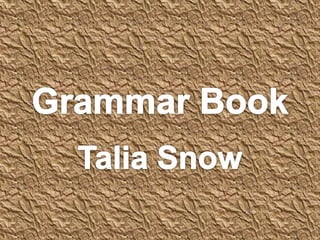
Grammar book
- 2. Table of Contents • Que vs. Cual • Relflexive • Conjugating Ser • Tú commands • Ser (DOCTOR PED) – Irregular • Estar (Helping PED) – Negative • Las formas de gustar – Affirmative • Palabras transitionales • DOP Placement • El Imperfecto • Preterite • Triggers • Cómo estás • Acabar de + infinitive • Hace + time + que + present • Hay + que +infinitive
- 3. Qué vs. Cual Qué Cual • What? • Which or what? • Used when asking • Used in front of for a definition “es” or any other conjugation of ser for all other purposes
- 4. Conjugating Ser Son Sois Somos Es Eres Se Soy
- 5. Descriptions Origin ¿Qué es? (De) ¿De donde Characteristics ¿Como es? es? Time Ser ¿Qué hora es? Occupation Relationships ¿Qué hace? ¿Quien es? Possession (De) Dates ¿De quien es? Events ¿Que dia es ¿Cuando/Donde es? hoy?
- 6. Estar (HELPINGAr- ando PED) Er/ir- iendo (yendo) • Health: ¿Como estás? Bien, mal regular, enfermo, enferma. • Emotions: ¿Como estás? Enojado, triste, cansado/agotado, feliz/ alegre/ contento/ emocionado, nervioso, tranquillp, ocupado • Location En: ¿Donde estás? En: la casa, la oficina, la escuela, el supermercado, el banco. La Universidad, el gimnasio, la lavanderia, el café, el restaurante, el eastadio, el aeropuerto, el museo, la biblioteca • Present Condition: ¿Como está? Abierto, cerrado, verde, maduro, limpoi, sucio, frio, caliente, lluvioso, soleado, nublado •I ¿Qué estás haciendo? Jugando, estudiando, cantado, •N •G } leyendo, escribiendo, comiendo, durmiendo, habiando, mirandola tele, paseando, camiando, comiendo, haciendo ejercisio
- 7. Las formas de gustar • me gusta (n) • It pleases me • Te gusta (n) • It pleases you • Le gusta (n) • It pleases him/her/formal you • Nos gusta (n) • It pleases us • Os gusta (n) • It pleases ya’ll • Les gusta (n) • It pleases them/you
- 8. Palabras Transitionales • Tambien • Also • Ahora • Now • Primero • First • Despues • After • Ni ni • or not • Por eso • Therefore • Pero • But • Entonces • Then • Asi que • So • Y • And
- 9. El Imperfecto Hablar Comer Escribir Yo hablaba comía escribía Tú hablabas comías escribías Él/ella/Ud. hablaba comía escribía Nosotros hablábamos comíamos escribíamos Vosotros hablais comíais escribías Ellos/ellas/Uds. hablaban comían escribían Ir Ser Ver Yo iba era Veía Tú ibas eras Veías Él/ella/Ud. iba era Veía Nosotros Íbamos éramos Veíamos Vosotros ibais erais Veais Ellos/ellas/Uds. iban eran veían
- 10. Triggers Todos los días Everyday A menudo Often A veces Sometimes Siempre Always Cada día Daily Los lunes Monday Generalmente Generally Mientras While De vez en cuando Occassionally Muchas veces Often Frecuentemente Frequently
- 11. Acabar de + Infinitive • To have just done something (in the very recent past) • acabo, acabas, acaba, acabamos, acabáis, acaban – Nosotros acabamos de leer el libro. We just read the book. – Ellos acaban de nadar en el mar. They have just swum in the ocean.
- 12. Hace + time + que + present • Used to talk about how much time you’ve been doing something – Hace treinta y cinco munutos que Talia come el almuerzo.
- 13. Hay + que +infinitive • Used to talk about what needs to be done or what must be done. (impersonal- not directed to anyone in particular) – Hay que estudiar para sacar buenas notas.
- 14. Verbos como gustar the verb is conjugated to agree with the subject of the sentence. Me Gusta Gustan Gustar Te Falta Faltan Faltar Le Duele Duelen Doler Nos Fascina Fascinan Fascinar Les Molesta Molestan Molestar
- 15. Reflexives • Reflexive Verb: Verbs that you do for/to yourself • Reflexive verbs ALWAYS end in -se • Ejemplo: despertarse, lavantarse, acotarse, ducharse, lavarse
- 16. Tú Commands Di Ven Haz Ten Irregular Ve S Pon é Sa l
- 17. Tú Commands • Negative tú commands – Ar e – Er/ir a • Drop the -o of the present tense YO form of the verb, and add –es – Tomo No tomes – Trabajo No trabajes
- 18. Tú Commands • Affirmative – Simply drop the “s” • Pronoun placement: the pronoun is attached to the end of affirmative commands • Ex: ¡Comelo! – Eat it!
- 19. DOP Placement • DOP pronouns take the place of a noun • Can attach to an affirmative command me nos te os lo/la los/las
- 20. Preterite • Used for past actions • Drop the ending and add: -ar -er/ir é í aste iste ó ió amos imos asteis isteis aron ieron
- 21. ¿Cómo estás? Estoy … Muerto de hambre Die of hunger Celoso Jealous Muerto de Die of thirst Confundido Confused sed Satisfecho Satisfied Curioso Curious Serio Serious Deprimido Depressed Solo Alone Determinado Dtermined Sorprendido Surprised Enamorado In love Tranquilo Calm Fascinado Fascinated Histérico Hysteric Frustrado Frustrated Libre Free Furioso Furious